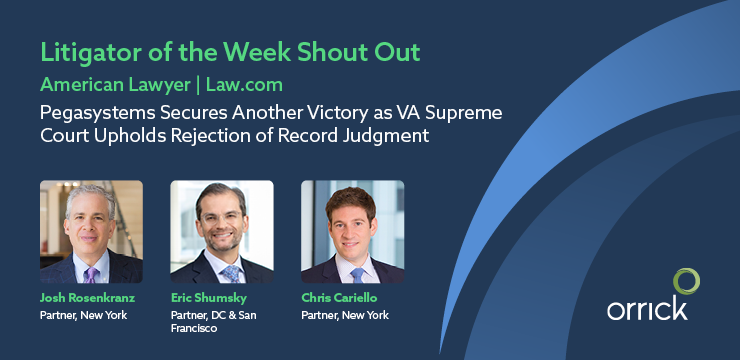Partners Jared Bobrow and Rob Shwarts Named to Daily Journal’s list of 2019 Top Intellectual Property Lawyers

Our Employment Law & Litigation team devotes a substantial portion of their practice to trade secrets and employee mobility issues, and has the expertise and experience needed to litigate any trade secrets matter. The team also both drafts and counsels clients on restrictive covenants and noncompetes, which vary from state to state and require informed judgment calls. We know how to litigate when these contracts are violated. Our team also has decades of experience conducting investigations into employee conduct and wrongdoing, including cases where multiple employees are implicated.
Our Intellectual Property team has the technical knowledge often underlying the trade secrets at issue, and has expertise handling trade secret issues that arise when companies share information in the context of actual or potential acquisitions or collaborations, as well as in the employee mobility context. Our lawyers provide thoughtful, streamlined advocacy at evidentiary hearings and have tried trade secrets cases before judges and juries. We also litigate matters before the ITC, an increasingly popular venue for trade secrets cases, which demands ITC experts who can navigate ITC’s unique procedural complexity and speed.
Our Complex Litigation & Dispute Resolution team resolves large, messy trade secrets disputes—in and out of court. The team aligns the litigation effort with the business outcome—whether that means securing an early settlement or taking a case through verdict and enforcement. Our lawyers are deeply familiar with specific trade secrets claims and the business issues that end up in litigation.
Our premier White Collar and Criminal Defense team enables us to handle complex criminal trade secrets prosecutions on both coasts of the United States, including securing a unanimous defense verdict for a client in a hard-fought trial in the Northern District of California in 2020. Our presence in China also helps us handle matters involving Chinese nationals and companies when implicated in criminal proceedings.
Our Cybersecurity team understands cyber issues and frequently advises clients on preventative action with best in-class policies, procedures and compliance programs. If a cyber breach does occur, we can both address mitigation and mount a litigation defense.
Represented wearable fitness device maker, Fitbit, and six former Jawbone employees in a trade secrets war with its rival, Jawbone. Jawbone alleged its former employees misappropriated information on Jawbone’s supply chain, product lineup, revenue, and product costs. After the civil matter settled, the federal government indicted the employees. We represented the first employee to be tried. After a two-week jury trial, we secured her full exoneration. The government then dropped the charges against the additional defendants. The team included lawyers from our Employment, Intellectual Property, and White Collar practices.
Secured a victory for Microsoft in an unusual trade secrets case that sparked public debate as to whether diversity-related information can be a protectable trade secret. Microsoft hired IBM’s Global Head of Diversity, after which IBM sought a preliminary injunction and accused the executive of violating a one-year noncompete agreement. We successfully resolved the litigation, and the executive was permitted to join Microsoft. The team included lawyers from our Employment practice.
Successfully represented Advanced Technology & Materials (ATM), which was accused of trade secret misappropriation by Hitachi Metals and its subsidiary Metglas in a case before the ITC. ATM is a Chinese state-owned enterprise, and a loss could have resulted in Customs blocking the importation of all of AT&M’s amorphous metals into the United States. The judge granted Hitachi/Metglas’s motion to withdraw its complaint after Hitachi/Metglas determined that insufficient evidence existed to prove their claims, representing a complete victory for our clients without the requirement of any settlement or monetary payment. We achieved this result while still maintaining a very cooperative approach with the ITC’s Office of Unfair Import Investigations. The team included lawyers from our Intellectual Property and Complex Litigation and Dispute Resolution practices.
Orrick attorneys successfully represented Advice Interactive Group against Web.com, Inc.in a trade secrets misappropriation and copyright infringement case relating to the development of an online presence reporting platform. The team successfully obtained a preliminary injunction on behalf of Advice Interactive where the court found a likelihood of success on the merits of all claims. The matter continued through fact and expert discovery, where the team dealt with complex issues related to the description of the technical trade secrets, detailing all instances of disclosure following the death of a key engineer working on the project on behalf of Advice Interactive, and damages apportionment issues. Ultimately, the case settled favorably to our client. The team included lawyers from our Intellectual Property practice.
Obtained a highly favorable decision for AQR Capital Management (one of the largest hedge funds in the United States, known for their high-frequency algorithmic trading programs), reducing a noncompete covenant restricting a new AQR Senior Researcher from 24 to 6 months. Following significant expedited discovery and a multiday evidentiary hearing, the court held that the 24-month covenant period was unreasonable and reduced the length of the noncompete covenant to 6 months, allowing the researcher to quickly join the company. The team included lawyers from our Employment practice.
Represented Couchbase as plaintiff against Redis Labs and three of its current and former employees for trade secret misappropriation, breach of contract, and breach of duty of loyalty. The case was hard-fought and moved to the complex case docket after two years of litigation. On the eve of a scheduled hearing on nearly two ,dozen discovery motions, the defendants withdrew all of their motions except one whereas Couchbase pressed on and prevailed on each of its motions to compel. Shortly afterward, the case settled, with Couchbase securing an extremely favorable settlement that included a permanent injunction and forensic audit. The team included lawyers from our Employment, Intellectual Property, and White Collar practices.
Represented Synopsys in a $90 million-plus software piracy case that involved claims under the Digital Millennium Copyright Act (“DMCA”), the RICO Act, multiple federal anti-counterfeiting statutes, and common law torts of deceit. The case presented several questions of first impression under federal counterfeiting statutes. Furthermore, it involved more than 30,000 acts of unauthorized access to Synopsys’ sophisticated semiconductor design software by competitor Ubiquiti. The case settled on terms favorable to our client, with Ubiquiti permanently enjoined by the Court from using Synopsys material. The team included lawyers from our Intellectual Property practice.
On the eve of 10X Genomics’s product launch, Bio-Rad Laboratories filed suit in California alleging misappropriation of various next-generation genomic sequencing technologies, biochemistries, and microfluidics. Bio-Rad later initiated arbitration against 10X’s co-founders, citing violation of noncompetition and confidentiality agreements signed in connection with the sale of a previous startup to Bio-Rad. After successfully staying state court litigation, we prevailed in arbitration. The team included lawyers from our Employment and Intellectual Property practices.
Representing ExamWorks, a leading medical technology company, in litigation against former employees who took significant trade secrets and confidential information to start a competing company. Within a week, our team was able to prepare and file a complaint, TRO, and preliminary injunction papers (including five substantive declarations), a motion for expedited discovery, and motion to seal. The court granted all of our requested relief, including a TRO prohibiting the defendant from conducting business with any of the clients and doctors identified in the stolen materials and requiring Defendants to pay for the forensic expert’s fees. The Court later granted a preliminary injunction, affirming the entire scope of the TRO. The team included lawyers from our Complex Litigation and Dispute Resolution and Intellectual Property practices.
Represented Desktop Metal in the 3D printing industry’s most high-profile litigation to date. This fierce battle against competitor Markforged involved claims of trade secrets, patent infringement, and breach of fiduciary duty. After the matter was bifurcated, our cross-practice team successfully defeated both cases, winning a stunning victory for our client. The team included lawyers from our Intellectual Property, Employment, and Complex Litigation and Dispute Resolution practices.
Orrick represented Teknor Apex Company, one of the leading materials companies in the United States, in a trade secret litigation arising out of a failed joint venture. After removing the case to federal court and successfully moving to dismiss a number of claims from the original complaint, we were able to negotiate a favorable settlement early in discovery—shortly after taking the first, key 30(b)(6) deposition of the plaintiff.

1 minute read | January.23.2026
